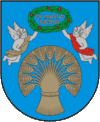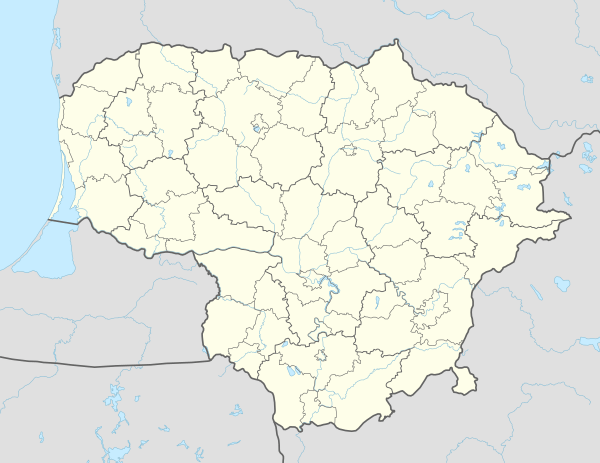Žasliai
Žasliai (Polish: Żośle, Yiddish: זאָסלע Zosle) is a small town in Kaunas County in central Lithuania. In 2011, it had a population of 644. The town was first mentioned in written sources in 1457 and was granted the Magdeburg rights and its own coat of arms in 1792 by the Grand Duke of Lithuania and King of Poland Stanisław August Poniatowski.[1]
Žasliai | |
|---|---|
Town | |
 | |
 Coat of arms | |
 Žasliai Location in Lithuania | |
| Coordinates: 54°51′50″N 24°35′20″E | |
| Country | |
| Ethnographic region | Aukštaitija |
| County | |
| First mentioned | 1457 |
| Granted city rights | 1792 |
| Population (2011) | |
| • Total | 644 |
| Time zone | UTC+2 (EET) |
| • Summer (DST) | UTC+3 (EEST) |
History
In the middle of the nineteenth century, approximately 650 Jews resided in Žasliai. On the eve of the Soviet annexation of Lithuania in 1940, the roughly 1000 Jewish inhabitants of the town made up half of the total population, making a living from commerce, artisanship and agriculture. On June 22, 1941, the German army invaded Lithuania, entering Žasliai within days thereafter. Lithuanian nationalists took over the town and began looting Jewish property and attacking local Jews. Accusing the Jews of collaborating with the Soviets, the Lithuanians detained Jewish men, and transferred them to the nearby town of Kaisiadorys. On August 17 of 1941, most of the town’s Jewish inhabitants were driven out to Kaisiadorys. Ten days later they were killed, along with Jews from Kaisiadorys and Ziezmariai. On September 22, 1941, Žasliai’s remaining Jews were taken to the nearby town of Semeliskes, where they were shot on October 6, 1941, along with the town’s entire Jewish population. [2] The Red Army liberated Žasliai in the summer of 1944, plunging the village into nearly half a century of soviet, Communist tyranny. Having been liberated by the collapse of the Soviet Union three decades ago, the quality of life in the village has significantly increased.
Notable People
References
- "Žasliai". vle.lt (in Lithuanian). Retrieved 7 April 2020.
- https://www.yadvashem.org/untoldstories/database/index.asp?cid=483
- This article was initially translated from the Lithuanian Wikipedia.
